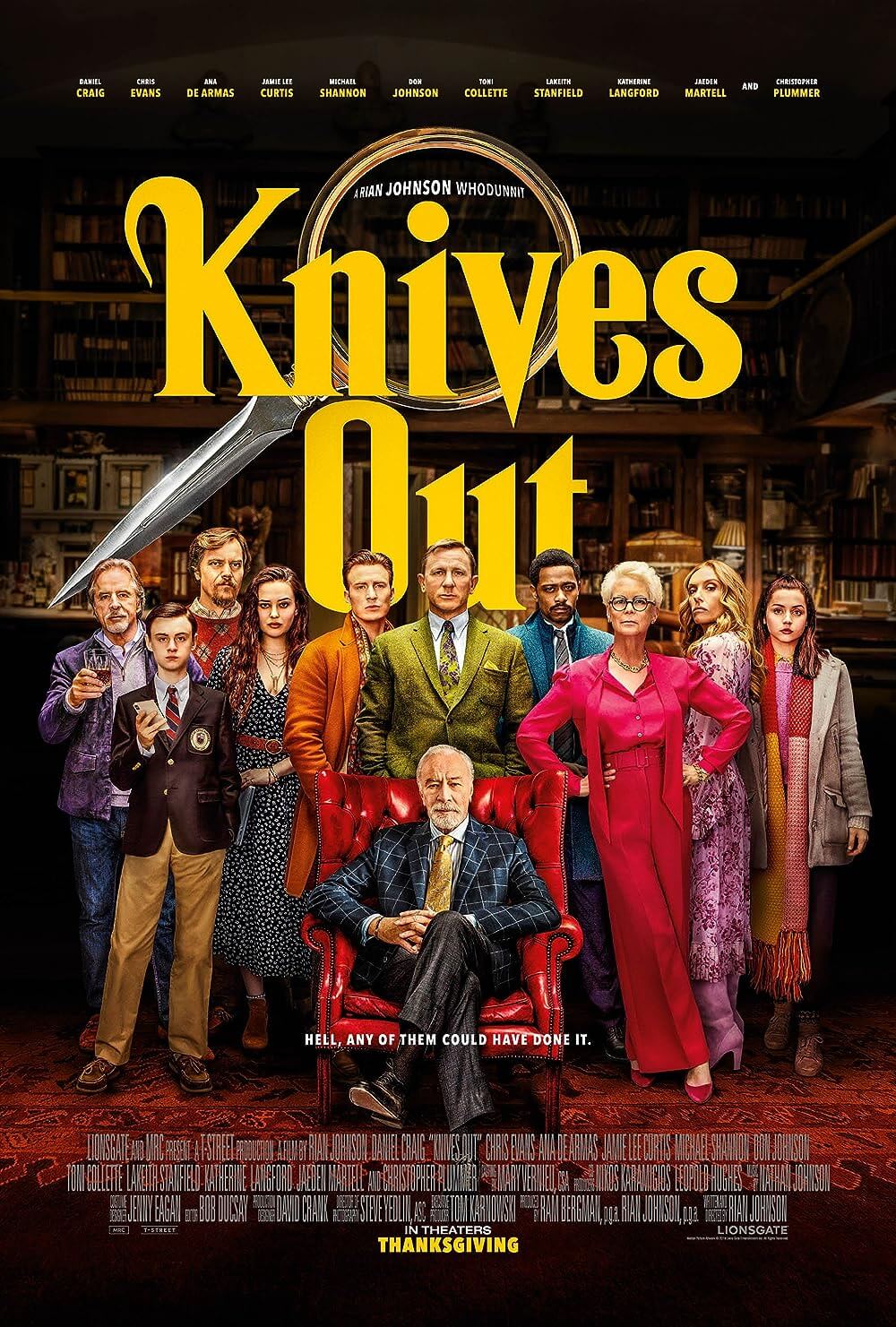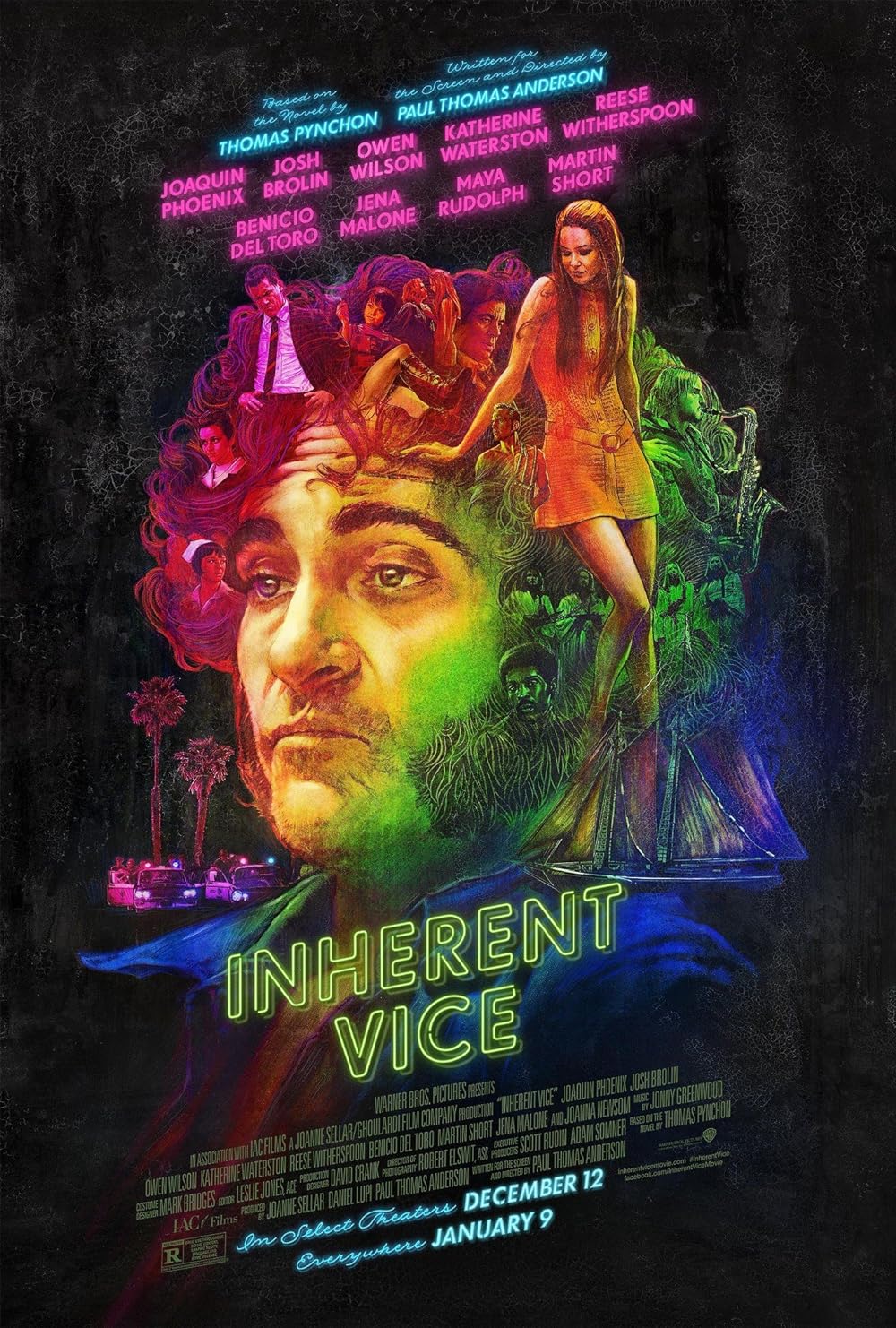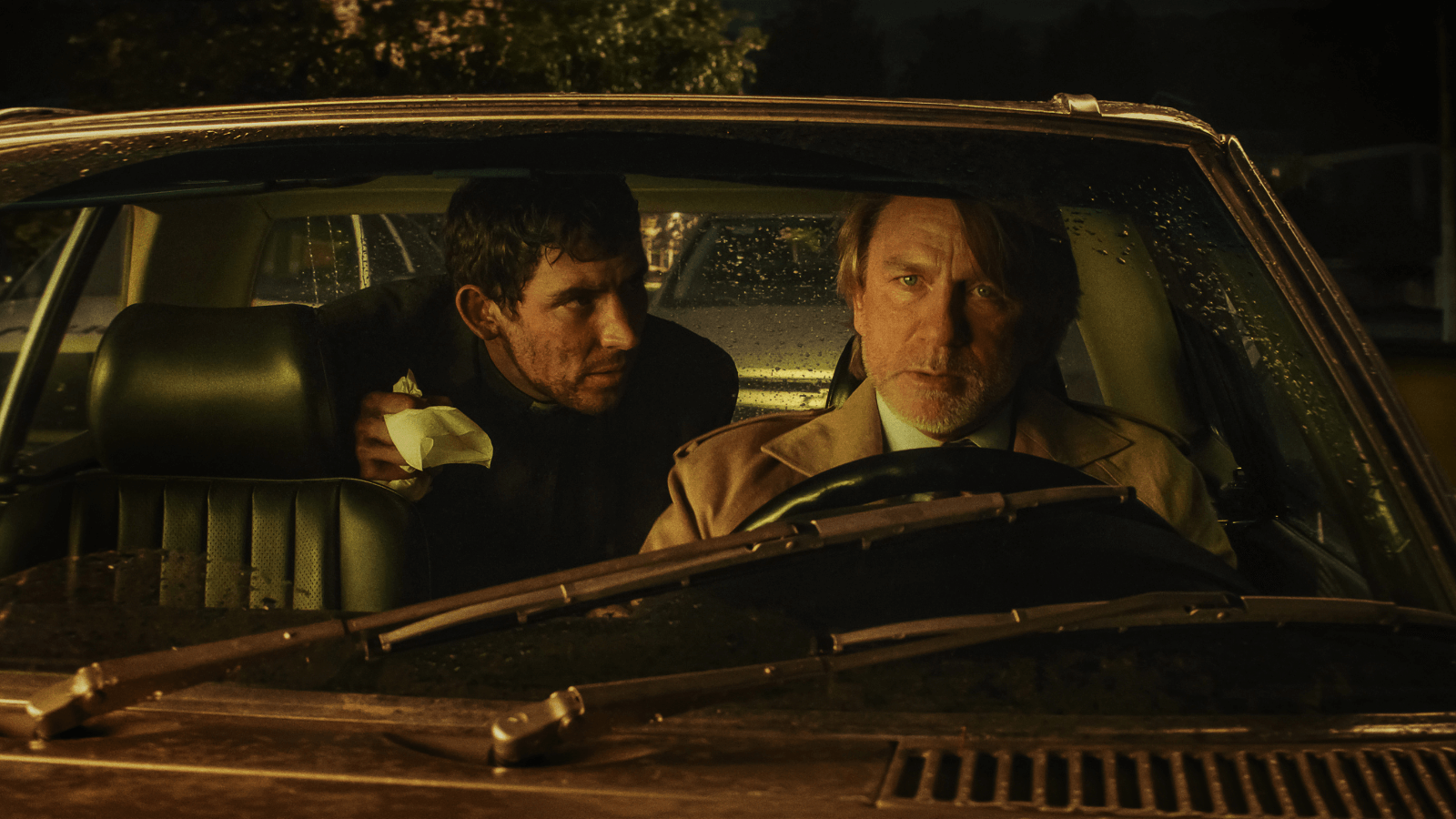
Wake Up Dead Man: A Knives Out Mystery
By Brian Eggert |
Few things are more disappointing than a whodunit with a predictable twist. Fortunately, Rian Johnson hasn’t had that problem yet in his series of mysteries about private investigator Benoit Blanc, delightfully played with a Foghorn Leghorn drawl by Daniel Craig. After deconstructing the genre with 2019’s Knives Out, Johnson signed a ridiculously lucrative deal with Netflix for a reported $450 million to continue the series with two new titles, both with the subtitle, A Knives Out Mystery. It’s a label specific to the first film that doesn’t really apply to the sequels. Wouldn’t “A Benoit Blanc Mystery” be more apt? Nevertheless, the second Blanc film, Glass Onion (2022), replicated the formula of the first—a murder in a rich man’s house, an all-star cast playing money-grubbing parasites, and an impossible-to-predict culprit—with ample energy and humor but a curious sameness. Johnson rethinks the model for Wake Up Dead Man, a sharp, engrossing new installment featuring his best ensemble cast yet. But one thing hasn’t changed: the filmmaker’s disdain for those who grab at power and wealth remains a vibrant theme pulling the suspects (i.e., everyone) in various (mis)directions.
Johnson roots Wake Up Dead Man in the unsolvable locked room mystery, a subgenre of the whodunit in which a detective must uncover how a murder could have occurred within a confined space, usually a windowless room. The locked room makes it impossible for anyone to commit a murder and escape without leaving clues. His screenplay nods to John Dickson Carr’s 1935 book The Hollow Man, famous for a passage in which its main character, amateur sleuth Dr. Gideon Fell, divulges the many ways in which a murderer can carry out their plan under such circumstances. Johnson, ever the enthusiast for this genre, builds an elaborate mystery around this concept. But for much of the film’s 144-minute runtime (the longest of the three), Johnson sets up the stakes and motivations before even telling us who was murdered. Most of the story unfolds in a flashback, told to Blanc by Reverend Jud Duplenticy (Josh O’Connor, continuing his superb run in the last few years), who narrates the first half from a letter.
The structural conceit is just one of the many clever games Johnson plays here. The writer-director constantly upends genre traditions, reworking them from the inside out. He’s done this by setting a neo-noir thriller in a high school with Brick (2005); reframing the narrative in his time-travel yarn Looper (2012), his best to date; and even with his Star Wars sequel, The Last Jedi (2017), which broke from convention in enough ways to sour some superfans. With Wake Up Dead Man, Johnson makes Jud the focus, detailing his arrival at Our Lady of Perpetual Grace, a church he was assigned to as a kind of punishment for his brash behavior. Jud—who believes wholeheartedly that “Christ came to heal the world, not to fight it”—used to be a boxer. After killing an opponent when he was 17, Jud went into the priesthood, and he continues to suppress his boxer’s instincts that sometimes emerge in heated moments. Even after Blanc enters the picture, O’Connor’s presence remains so central and magnetic that the detective risks feeling like an afterthought.
When Jud arrives at his new post in upstate New York, he finds the church’s few parishioners uncommonly devoted to their intense Monsignor, Jefferson Wicks (Josh Brolin), whose gray beard and long hair make him look like he should be spouting end-of-days predictions on a street corner. Wicks isn’t satisfied with his sermons unless he drives someone to leave mass, offended by his raving that people should choose God over their families. When he ends up with a knife in his back after some particularly zealous preaching—in a concrete closet just off from the stage, with everyone attending able to confirm that no one was able to enter or leave the room without being seen—everyone suspects Jud. The townsfolk call him the “killer priest,” since the two holy men clashed over Wicks’ showboating, fire-and-brimstone interpretation of the priesthood, dubious behavior, and desire for the spotlight. It doesn’t help that a video emerged of Jud telling Wicks that he would cut him out from the church “like a cancer.”
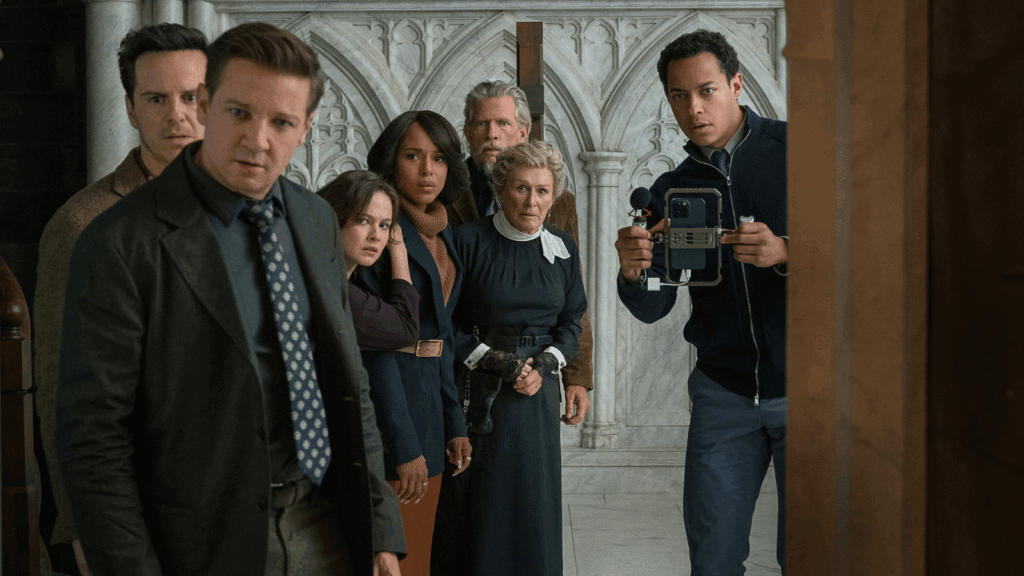
When Blanc arrives, he believes Jud is innocent and looks to the churchgoers for suspects. But these are more than just your usual attendees of Sunday mass; they are Wicks’ acolytes, supporting him with vast sums of money and unwavering loyalty. When the former cellist Simone (Cailee Spaeny) contracted a mysterious illness that gave her chronic pain and left her in a wheelchair, she put her faith and millions in Wicks. So did sci-fi writer Lee (Andrew Scott), who has practically given up fiction for religious extremism. After his wife and kids left him, the local doctor (Jeremy Renner) found solace in Wicks’ doctrine. There’s also Vera (Kerry Washington), a well-to-do lawyer who raised Cy (Daryl McCormack), her father’s illegitimate son. Cy wanted to become a right-wing politician but resolved to become a social media instigator when he couldn’t build a following. Working at the church is Martha (Glenn Close), Wicks’ right-hand woman, and the groundskeeper (Thomas Haden Church). Mila Kunis feels wasted as a local cop convinced of Jud’s guilt. Somehow, all of this connects to Wicks’ late mother, whom he dubbed the “harlot whore” after she tore up the church looking for a multi-million-dollar inheritance hidden somewhere on the grounds.
Johnson thoughtfully explores faith, the church, and devotion in ways that do not demean the Christian belief system, but they question the motivations of manipulative men who exploit those with faith. Wicks wants to keep people angry and afraid; they’re easier to control that way. Any notion of love and forgiveness proves too wishy-washy for him. His cult-leader vibe works all too well. At one point, Renner’s character tells Wicks there’s literally nothing he could say or do that would cause their loyalty to waver. Sound familiar? But like many leaders who stoke fear and demand fealty, Wicks is both a despot and a huckster. Blanc, of course, is an atheist who sees through the pageantry of the church and views the Bible as a series of fictions. However, the film aligns with Jud, who sees the potential for faith and argues for the power of storytelling to reflect the feelings of those who believe.
Wake Up Dead Man doesn’t have the flashy aesthetics of Johnson’s other work. It’s grounded in strong character work and an engaging mystery, but the cinematography by Steve Yedlin incorporates sunlight (hiding behind clouds, emerging from clouds, and peering through stained glass) in ways that can feel subtly symbolic or, in one scene with Blanc, downright overwrought. Even so, Johnson keeps the viewer guessing throughout, compelled by the excellent performances from the ensemble, particularly Craig and O’Connor, the latter of whom serves as the narrative thrust in the same way Ana de Armas did in Knives Out and Janelle Monáe did in Glass Onion. Although the story begins to drag a little in the last third, it’s a richly conceived and executed production, with remarks on social media, spiritual searching, church as a form of brainwashing, and the dangers inherent to dogmatic leaders—all of which feel appropriate for the times. It doesn’t quite have the novelty of the original, but it’s a welcome sequel and an improvement on the last installment.
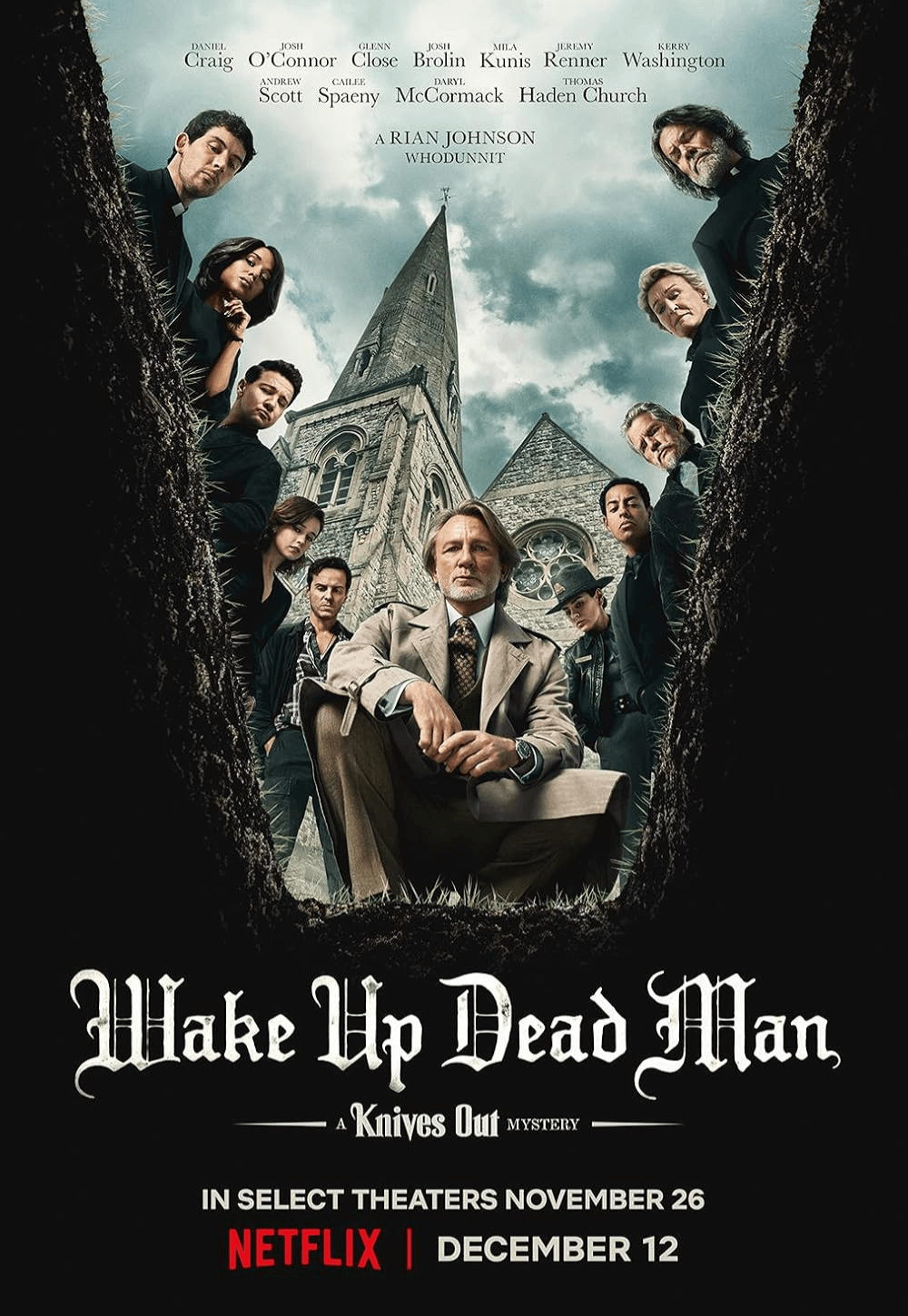
Thank You for Supporting Independent Film Criticism
If the work on DFR has added something meaningful to your love of movies, please consider supporting it.
Here are a few ways to show your support: make a one-time donation, join DFR’s Patreon for access to exclusive writing, or show your support in other ways.
Your contribution helps keep this site running independently. However you choose to support the site, please know that it’s appreciated.
Thank you for reading, and for making this work possible.
Brian Eggert | Critic, Founder
Deep Focus Review


